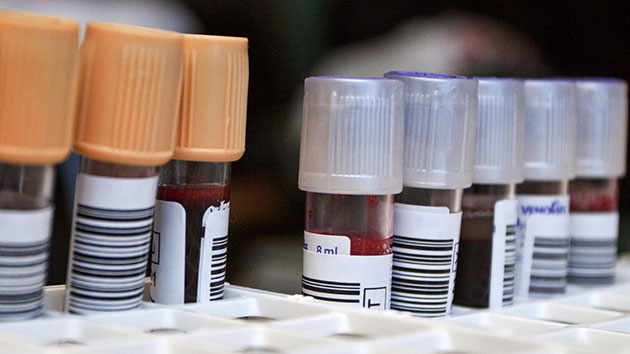
Scientists will start testing whether treatment with antibodies in the blood of Ebola survivors can help infected patients fight off the deadly disease in a clinical trial starting in Guinea next month. If effective, so-called convalescent serum could be scaled up quickly as a short-term intervention while work continues to develop drugs and vaccines.
An international research consortium led by the Institute of Tropical Medicine in Antwerp is undertaking the work in the West African country where the world’s worst Ebola outbreak was first confirmed in March this year, after receiving a 2.9-million-euro ($3.7-million) grant from the European Union.
“Blood and plasma therapy are medical interventions with a long history, safely used for other infectious diseases,” said Dr. Johan van Griensven, the project’s coordinating investigator. “We want to find out whether this approach works for Ebola, is safe and can be put into practice to reduce the number of deaths in the present outbreak.”
The rationale behind the approach is that blood from recovered patients contains antibodies and other components that may help the transfused patient fight off the virus. Antibodies are produced by the body’s immune system to fend off harmful things such as viruses. They remain in the blood ready to fight off any future infections by the same foreign substance. Blood from survivors of diseases including bird flu and anthrax has been used in the past when doctors ran out of options and seems to work best in diseases where there’s a toxin, such as anthrax and tetanus.
Limited evidence on effectiveness of convalescent serum
The approach has gained appeal as a near-term option because several of the experimental drugs and vaccines being developed for Ebola are in limited supply or haven’t been sufficiently tested for safety and efficacy. After convening a panel of more than 150 experts in September, the WHO said the severity of the current Ebola epidemic meant that pursuing experimental treatments that showed signs of promise satisfied many concerns regarding medical ethics, and that it was appropriate to try using the convalescent serum to treat Ebola patients.
A few isolated patients in the current outbreak have already received blood-product transfusions. Kent Brantly, the American missionary doctor who contracted Ebola in Africa, received a transfusion from a 14-year-old survivor while in Africa. After Dr. Brantly was evacuated to the U.S. for treatment and recovered, he donated his own plasma to at least three patients: Nina Pham, a nurse from Dallas undergoing treatment in Bethesda, Md., who contracted the virus while treating an infected patient; physician Rick Sacra, who has since recovered from Ebola contracted in Africa after treatment at Nebraska Medical Center; and Ashoka Mukpo, a news cameraman released this week from the same Nebraska hospital.
But the evidence on convalescent serum is limited. In a 1995 outbreak in the Democratic Republic of the Congo, seven out of eight Ebola patients who received blood transfusions from recovered patients survived, according to a study published in the Journal of Infectious Diseases. However, the researchers said the relatively low fatality rate may have been due to better care among the transfused patients than other Ebola patients in that outbreak, and that further study was needed.
Trial expected to start within two months
The new research is scheduled to begin by the end of the year in Guinea, one of the three West African countries that have been hit hardest by the Ebola outbreak. So far, at least 4,877 people have died, out of 9,936 total cases, according to the World Health Organization.
Dr. van Griensven said the study would recruit at least 200 patients who will receive either whole blood or blood plasma from recovered patients. Their outcomes will be compared with a greater number of patients who don’t receive transfusions because they don’t have matching donors, he said. All patients would receive a standardized level of supportive care, including intravenous fluids, he said.
He expects to have preliminary results in the whole-blood portion of the study by March or April of 2015, and for the plasma portion later in the year. Dr. van Griensven suggested that when people in the affected communities see Ebola survivors helping to stop the epidemic by donating blood, they will become less fearful and more accepting of treatment. It could also help to reduce the stigma attached to Ebola survivors, he said.
Meanwhile, the WHO said earlier this week that they expect “tens of thousands of doses” of Ebola vaccines to be ready for testing in the field by January if they are shown to be safe in current trials.
‘We’re in a race against time on Ebola’
The convalescent-serum trial is one of five Ebola-related projects for which the European Commission said Thursday it is pledging a total of €24.4 million ($30.9 million). The other projects include studies of an Ebola vaccine co-developed by GlaxoSmithKline and the U.S. National Institutes of Health; a study of the anti-influenza drug Avigan; a study of the transmission of Ebola virus; and a study of antibodies produced in horses against Ebola. Funding is being fast-tracked from the EU research and innovation program Horizon 2020.
A crucial task for future research is to examine a broad collection of antibodies from Ebola survivors across the population. Because every individual’s immune system reacts to a virus differently, and because every infected person has a different viral load, the best odds for combating the virus will involve finding a very particular dose of antibodies.
“We’re in a race against time on Ebola,” said José Manuel Barroso, President of the European Commission (EC), the executive body of the EU. “We must address both the emergency situation and at the same time have a long term response.”
